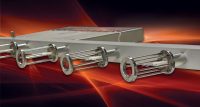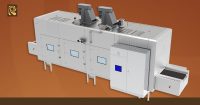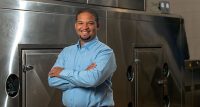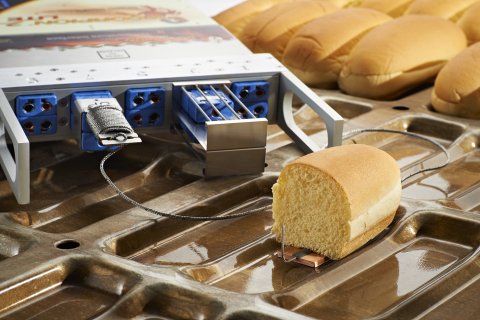Reading Bakery Systems Hires Industry Veteran David Welch as Sales Manager, Europe
 Reading Bakery Systems (RBS), a global leader in snack production systems, has appointed baking industry veteran David Welch as the new Sales Manager for Europe. In this role, David will be responsible for selling RBS equipment and process solutions to clients across the region.
Reading Bakery Systems (RBS), a global leader in snack production systems, has appointed baking industry veteran David Welch as the new Sales Manager for Europe. In this role, David will be responsible for selling RBS equipment and process solutions to clients across the region.
“David brings a wealth of biscuit, cookie, and cracker experience, which will expand our already strong position in the European snack market. His deep process and technical knowledge will undoubtedly make him a key contributor to the ongoing growth of RBS and our customers in Europe.” said Joe Pocevicius, Director, EMEA & APAC for RBS.
Welch is a senior engineer with more than twenty years’ experience in food manufacturing, primarily focused on biscuit, cookie, and cracker production. Prior to joining RBS, he held numerous positions including Commissioning Engineer, Engineering Project Manager, and Chief Engineer at Baker Perkins. Additionally, he worked as Engineering Project Manager at Cerealto, overseeing the implementation and start-up of a new facility.
Welch holds a bachelor’s degree in mechanical engineering from Aston University, Birmingham, UK.
To learn more about RBS or our employment opportunities, visit www.readingbakery.com, call +01 610.693-5816 or connect with us on social media.
Next-Generation Digital Air Velocity Sensor Array from Reading Thermal Employs Latest Technology to Increase Accuracy, Consistency, Repeatability
 Reading Thermal, the leading brand of measurement data logging systems by Reading Bakery Systems (RBS), has announced the release of a new SCORPION 2 Digital Air Velocity Sensor Array that offers improved accuracy, expanded temperature performance and extended battery life.
Reading Thermal, the leading brand of measurement data logging systems by Reading Bakery Systems (RBS), has announced the release of a new SCORPION 2 Digital Air Velocity Sensor Array that offers improved accuracy, expanded temperature performance and extended battery life.
The Digital Air Velocity Sensor Array delivers a precise picture of airflow patterns inside an oven, dryer or cooling tunnel, from side-to-side and end-to-end. The many improvements made further enable snack manufacturers with an accurate, repeatable, and consistent means to monitor and maintain product quality from any oven system.
“Our new Digital Air Velocity Sensor sets the industry benchmark for accuracy, consistency and repeatability. Using the latest digital technology means better response times, higher accuracy, wider operating conditions and extended battery life – giving bakers the best equipment for maximizing oven performance.” said Andrew Rosenthal, General Manager, Reading Thermal.
This next-generation Digital Air Velocity Sensor Array uses the latest thin-film platinum RTD chips, not manually-wound wire anemometers, which minimizes sensor-to-sensor variation while maximizing repeatability and consistency. These new, smaller chips are lighter than previous elements resulting in a 37% improvement in response times. The redesigned circuitry also improves battery life by as much as 91% when connected collecting data with a 1.2m Air Velocity Array.
The new Digital Air Velocity Sensor maintains its accuracy from ambient through a hot oven making it more convenient to profile your process. Dedicated 24-bit A-D converters eliminate the inaccuracies of analog conversion and proprietary Smart Temperature Compensation self-adjusts for varying process temperatures. Together, these improvements lead to a 36% increase in accuracy at 300ºF versus other air velocity sensors.
The new Digital Air Velocity Sensor Array will be on display at IBIE 2022 in RBS booth #3425 and is available for testing at the RBS Science & Innovation Center.
Reading Bakery Systems Partners with the Center for Advanced Research in Drying to Support Research and Technological Development
 Reading Bakery Systems (RBS), one of the world’s leading manufacturers of snack production systems, has announced a partnership with the Center for Advanced Research in Drying (CARD) to support academic research and drying technology development.
Reading Bakery Systems (RBS), one of the world’s leading manufacturers of snack production systems, has announced a partnership with the Center for Advanced Research in Drying (CARD) to support academic research and drying technology development.
RBS is currently designing and building a research dryer for CARD that will be capable of testing new drying techniques and sensors, including Ultrasonic technologies among others. Reading Thermal, an RBS brand, will also be working with CARD better their understanding of oven environmental measurement and data analysis via the Scorpion® 2 Profiling System.
“We’re excited to partner with CARD and actively support their research advancement. The next 30 years will be transformative to oven and dryer designs. RBS is well-known for innovation and we’ve already taken the lead on energy efficiency and carbon reduction through automation capabilities and sustainability initiatives. Andrew Rosenthal (Reading Thermal General Manager) and our engineering team have jumped right in and are working on new technologies to be developed with CARD.” said Joe Zaleski, RBS President.
CARD was established as an academic research venture by Worcester Polytechnic Institute (WPI) and the University of Illinois (UIUC) for the purposes of promoting the advancement of drying technologies. Although the membership is primarily food companies, including PepsiCo, Mondelez, Hershey, and Pepperidge Farm, program participation is open to any industry where drying technology is used.
For more information about Reading Bakery Systems or Reading Thermal, please visit: readingbakery.com or www.readingthermal.com.
To learn more about CARD, please visit: https://iucrc.nsf.gov/centers/center-for-advanced-research-in-drying/.
Reading Bakery Systems names Phillip Stringer Director of the Science and Innovation Center
 Reading Bakery Systems (RBS), one of the world’s leading manufacturers of snack production systems, has named Phillip Stringer Director of the RBS Science and Innovation Center (S&IC). In his new role, Phillip will oversee all aspects of the Science & Innovation Center, ensuring effective and efficient use of facilities and staff.
Reading Bakery Systems (RBS), one of the world’s leading manufacturers of snack production systems, has named Phillip Stringer Director of the RBS Science and Innovation Center (S&IC). In his new role, Phillip will oversee all aspects of the Science & Innovation Center, ensuring effective and efficient use of facilities and staff.
“We are pleased to welcome Phillip Stringer to the RBS Family. His technical, operational, and process development background make him a great addition to the S&IC team to optimize and lead our innovation operations. I have no doubt he will build upon the S&IC’s performance record in quality, delivery, and customer experience excellence.” said Travis Getz Vice President, Operations.
Prior to joining Reading Bakery Systems, Stringer held positions in technical operations for Nature’s Bakery, process development at Pharmative, as well as a research associate for the U.S. Department of Energy.
He holds a bachelor’s degree in chemical engineering from Tuskegee University in Tuskegee, Alabama and an MBA from Webster University in St. Louis, Missouri as well as certifications in pharmaceuticals and lean manufacturing.
For more information about Reading Bakery Systems market leading innovation or employment opportunities, please visit: readingbakery.com.
RBS Continues Its Virtual Snack Seminar Series
 The RBS Seminar Series in 2023 will continue to feature innovations in processing technologies and new snack products. These virtual events allow you to see the latest from our team in the comfort and safety of your home or office.
The RBS Seminar Series in 2023 will continue to feature innovations in processing technologies and new snack products. These virtual events allow you to see the latest from our team in the comfort and safety of your home or office.
We look forward to connecting with you…virtually!

